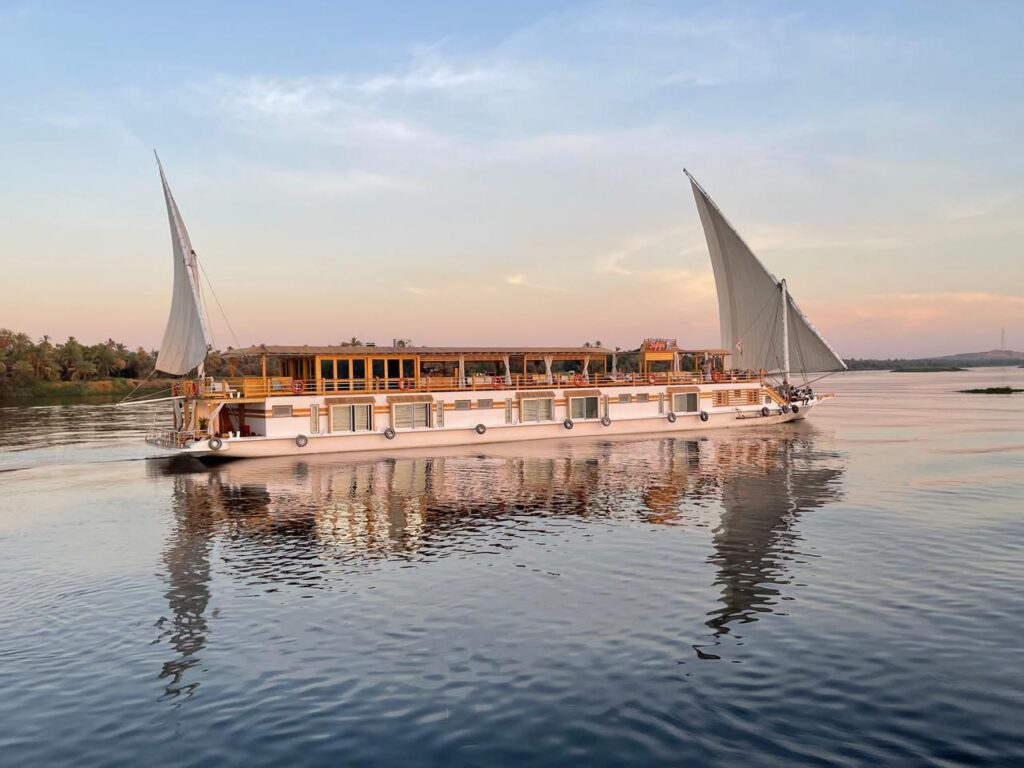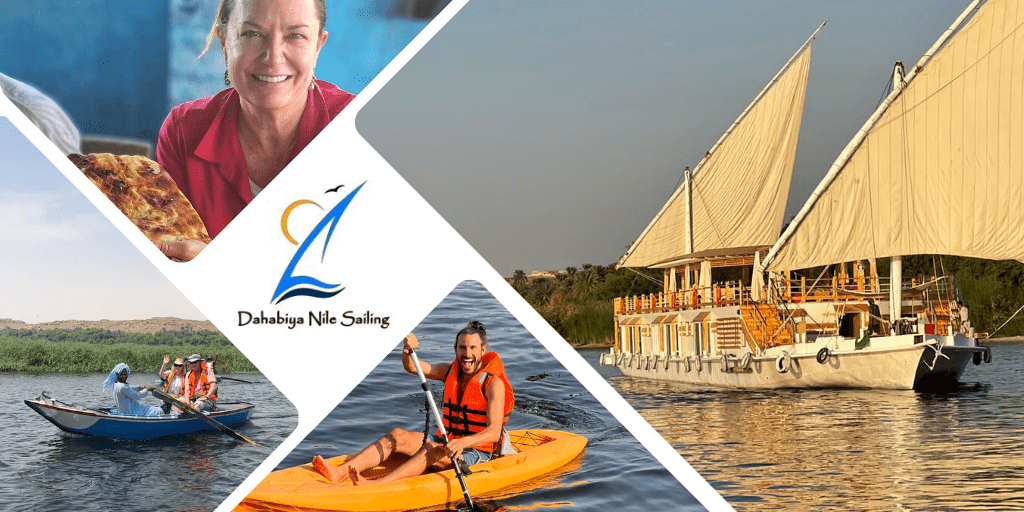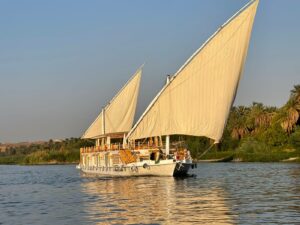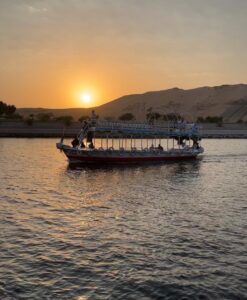
Nile Sailing
For centuries, the magnificent Nile River has captivated travelers and imaginations as the longest river and the source of life for one of the oldest civilizations in the world. Few experiences are better than sitting on the deck of a slow-moving boat as it glides along the Nile. Gaze into the fertile Nile Valley that is surrounded by desert, drifting past 5,000 years of culture. Sailing down or up the Nile is the best way to explore Southern Egypt. Board at Esna just South of Luxor (transfer is provided for those not already on tour with Real Egypt) and visit important sites including Edfu, Kom Ombo, and Aswan. On our Dahabiya Nile Sailing tour, you will visit more sites and communities.
On a longer cruise of 15 days from Cairo to Aswan you will also stop at Minya and visit more significant sites nearby.
Historically, the Nile cruise was really the only way to visit the temples and tombs located along this stretch of the river. It is still a popular means of visiting Upper Egypt and has many advantages over using other forms of travel.
Nile cruises visit a wide variety of antiquities along the banks of the river. Equally important, they also allow the tourist to gain a perspective of rural Egypt, where people live much the same way they did even thousands of years ago, in mud-brick homes, tending their fields with wooden ploughs and moving produce with donkeys.
Nile Sailing varies considerably, it is possible to cruise from 1 day to 15 days. There are over 330 cruisers plus the Dahabiya boats, Sandals, and Fellucca’s plying the river between Cairo and Aswan.
Dahabiya Nile Sailing
Enjoy our bundles of Nile sailing on our special dahabiya boats, You can check our Website here.

Dahabiya Nile Sailing tours
- Nile Cruise BoatThe usual river cruise is aboard a Nile cruiser, sometimes referred to as a floating hotel. The better boats have most of the accommodations of a land-based hotel, including small swimming pools, hot tubs, exercise rooms, discos, good restaurants, stores, and even small libraries. Depending on what one is willing to pay, rooms may be very utilitarian and compact, or larger than some land-based hotel rooms. They also offer various entertainments which range from live entertainment to onboard parties, for example Nubian shows, tanoura (whirling dervish), singers, plays, and even costume parties where guests dress in the traditional galebeya. All meals are included onboard, they are usually buffet style with a variety of international and local cuisine. Drinks normally are not included except for hot drinks at breakfast and afternoon tea. Minimum stay of three nights required.
- Dahabiya Nile SailingDahabiya Nile Sailing specialises in organising dahabiya cruises on the Nile designed for you to discover the treasures of Egypt as travellers of the past did, on a beautiful sailboat in a small group. The term dahabiya is normally used to describe a shallow-bottomed vessel with two or more sails. These vessels have been around in one form or another for thousands of years, with similar craft being depicted on the walls of the tombs of Ancient Egyptian Pharaohs. The name derives from the Arabic word for “gold”, owing to similar, gilded state barges used by the rulers of Egypt in the Middle Ages. Being smaller than the standard Nile cruise boats, our dahabiya can moor at and visit more sites and communities along the river than on the large boats, ensuring you have a more in-depth experience of life along the Nile. As dahabiya guests are less constrained by schedules and moorings, it is feasible to visit sites at quiet times or where larger ships can’t moor, so in addition to the temples at Edfu and Kom Ombo you get to explore El-Kab, Silsilah, Daraw, Bisaw and some other local villages which are otherwise difficult to reach. You will meet people who live from and on the Nile, you can see rare birds, listen to the sounds of nature, watch the scenery go by, and conjure up images of a bygone era as wind in the sails pushes the boat along. Dahabiya Nile Sailing offers guaranteed departure dates all year round. We are pioneers in offering dahabiya tours that aim to be more sustainable. Our crew (average number of 10 to 12 crew) come from local villages on our sailing route, and go above and beyond to make your journey special. We have a qualified guide onboard through the cruise, available 24 hours for your assistance. They speak your language fluently and Arabic to assist communication in the villages and help you understand the culture, and to answer your questions about the natural environments we pass through on the cruise. All meals are included, with a variety of international and local cuisine. Drinks are normally not included except for water, hot drinks at breakfast and afternoon tea time. Other types of drinks are available onboard for an extra charge. Our chef also conducts cooking classes onboard. Guests also have options to use kayaks and swim in the Nile. Solar panels in most boats to reduce consumption of fossil fuels. Metal water bottles, refillable on board throughout your tour, and cotton bags are provided to guests to minimise single use plastic. Dahabiya are often chartered for a private cruise by newlyweds, families or friends, because they have a small number of cabins: usually from 4 to 8, giving space for 6 to 16 people. A typical dahabiya has a spacious salon; wood-panelled cabins ventilated by sliding louvres, with brass fittings and tiled bathrooms; and an upper deck where meals are eaten. The top deck has an awning that can be rolled back for sunbathing. Boats over 38m (125 ft.) long can’t travel by sails and wind alone and have to use engines (technically disqualifying them from being called dahabiyas). A tugboat accompanies the dahabiya to assist when insufficient wind for sailing at required speed to reach destinations. During the night the dahabiya does not sail, it will moor on the banks of the Nile. A minimum stay of four nights is normally required.

- Sandal BoatAnother way to sail the Nile in tranquillity in small groups of up to 8 people, with the comforts of home, Ideal for a family voyage or with close friends. This style of boat has also been sailing on the Nile for a long time and was originally used for transporting clay pots and stones. Now the boats have been converted into spacious and attractive sailing boats with two sails. A sandal has 3 to 4 cabins, bathrooms, a kitchen, a living area and a sun deck. A Sandal boat will be able to take you to places that are not visited during the usual Nile cruises and will get you close to villages where you can walk among the people. Sandal guests are less constrained by schedules and moorings than on cruise boats, making it feasible to visit sites at quiet times or where larger ships can’t moor. In addition to the temples at Edfu and Kom Ombo, you get to explore El-Kab, Silsilah, Daraw, and some river islands and local villages which are otherwise difficult to reach. The pace of a sandal trip is dictated by wind and river conditions. On long-distance journeys these boats will be accompanied by a tug boat in case of lack of wind. During the night, the sandal will moor on the banks of the Nile. A minimum stay of 3 nights nights is normally required.
- FeluccaA more adventurous style of cruising the Nile These single mast boats have been sailing the Nile since ancient times and offer a unique experience of the river. Sailing so low in the water, the Nile’s horizon recedes like an infinity pool, its stillness broken only by passing cruise boats. Evenings often end around a campfire, enlivened by singing and drumming. The accommodations on a felucca are basic, tourists sleep out in the open on deck on mattresses, and the sailors are also your chefs. Some guests may prefer camping on shore. Felucca journeys between Aswan and Luxor are a uniquely Egyptian experience which many travellers rate as the highlight of their visit, but only those who love roughing it and camping. Unlike all of the other types of boats, there are no minimum nights required on board a felucca. This is the least expensive option of sailing the Nile. Note: Sailing itineraries are changeable according to the sailing conditions.



